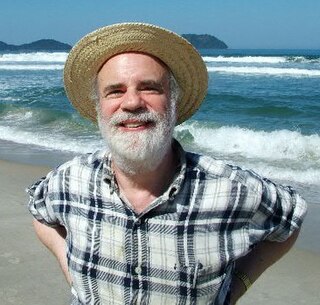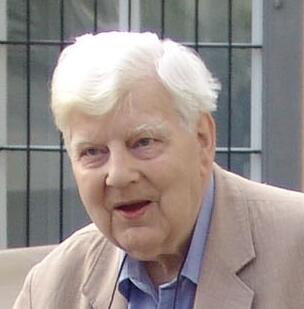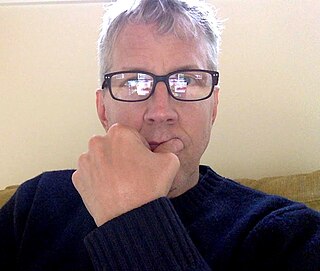Related Research Articles
The Berry paradox is a self-referential paradox arising from an expression like "The smallest positive integer not definable in under sixty letters".
In philosophy and logic, the classical liar paradox or liar's paradox or antinomy of the liar is the statement of a liar that they are lying: for instance, declaring that "I am lying". If the liar is indeed lying, then the liar is telling the truth, which means the liar just lied. In "this sentence is a lie", the paradox is strengthened in order to make it amenable to more rigorous logical analysis. It is still generally called the "liar paradox" although abstraction is made precisely from the liar making the statement. Trying to assign to this statement, the strengthened liar, a classical binary truth value leads to a contradiction.
A paradox is a logically self-contradictory statement or a statement that runs contrary to one's expectation. It is a statement that, despite apparently valid reasoning from true or apparently true premises, leads to a seemingly self-contradictory or a logically unacceptable conclusion. A paradox usually involves contradictory-yet-interrelated elements that exist simultaneously and persist over time. They result in "persistent contradiction between interdependent elements" leading to a lasting "unity of opposites".
Truth or verity is the property of being in accord with fact or reality. In everyday language, it is typically ascribed to things that aim to represent reality or otherwise correspond to it, such as beliefs, propositions, and declarative sentences.

Willard Van Orman Quine was an American philosopher and logician in the analytic tradition, recognized as "one of the most influential philosophers of the twentieth century". He served as the Edgar Pierce Chair of Philosophy at Harvard University from 1956 to 1978.

Saul Aaron Kripke was an American analytic philosopher and logician. He was Distinguished Professor of Philosophy at the Graduate Center of the City University of New York and emeritus professor at Princeton University. From the 1960s until his death, he was a central figure in a number of fields related to mathematical and modal logic, philosophy of language and mathematics, metaphysics, epistemology, and recursion theory.
Analytic philosophy is a broad, contemporary movement or tradition within Western philosophy, especially anglophone philosophy, focused on analysis as a philosophical method. It is characterized by a clarity of prose; rigor in arguments; and making use of formal logic and mathematics, and, to a lesser degree, the natural sciences. It is further characterized by an interest in language, semantics and meaning, known as the linguistic turn. It has developed several new branches of philosophy and logic, notably philosophy of language, philosophy of mathematics, philosophy of science, modern predicate logic and mathematical logic.

Metamathematics is the study of mathematics itself using mathematical methods. This study produces metatheories, which are mathematical theories about other mathematical theories. Emphasis on metamathematics owes itself to David Hilbert's attempt to secure the foundations of mathematics in the early part of the 20th century. Metamathematics provides "a rigorous mathematical technique for investigating a great variety of foundation problems for mathematics and logic". An important feature of metamathematics is its emphasis on differentiating between reasoning from inside a system and from outside a system. An informal illustration of this is categorizing the proposition "2+2=4" as belonging to mathematics while categorizing the proposition "'2+2=4' is valid" as belonging to metamathematics.

Sir Michael Anthony Eardley Dummett was an English academic described as "among the most significant British philosophers of the last century and a leading campaigner for racial tolerance and equality." He was, until 1992, Wykeham Professor of Logic at the University of Oxford. He wrote on the history of analytic philosophy, notably as an interpreter of Frege, and made original contributions particularly in the philosophies of mathematics, logic, language and metaphysics.

David Kellogg Lewis was an American philosopher. Lewis taught briefly at UCLA and then at Princeton University from 1970 until his death. He is closely associated with Australia, whose philosophical community he visited almost annually for more than 30 years.
Dialetheism is the view that there are statements that are both true and false. More precisely, it is the belief that there can be a true statement whose negation is also true. Such statements are called "true contradictions", dialetheia, or nondualisms.
In philosophy and logic, a deflationary theory of truth is one of a family of theories that all have in common the claim that assertions of predicate truth of a statement do not attribute a property called "truth" to such a statement.

In mathematical logic and philosophy, Skolem's paradox is the apparent contradiction that a countable model of first-order set theory could contain an uncountable set. The paradox arises from part of the Löwenheim–Skolem theorem; Thoralf Skolem was the first to discuss the seemingly contradictory aspects of the theorem, and to discover the relativity of set-theoretic notions now known as non-absoluteness. Although it is not an actual antinomy like Russell's paradox, the result is typically called a paradox and was described as a "paradoxical state of affairs" by Skolem.

Stephen Yablo is a Canadian-born American philosopher. He is the Emeritus David W. Skinner Professor of Philosophy at the Massachusetts Institute of Technology (MIT) and taught previously at the University of Michigan, Ann Arbor. He specializes in the philosophy of logic, philosophy of mind, metaphysics, philosophy of language, and philosophy of mathematics.

A mathematical object is an abstract concept arising in mathematics. Typically, a mathematical object can be a value that can be assigned to a symbol, and therefore can be involved in formulas. Commonly encountered mathematical objects include numbers, expressions, shapes, functions, and sets. Mathematical objects can be very complex; for example, theorems, proofs, and even formal theories are considered as mathematical objects in proof theory.
Ian Rumfitt is a British philosopher specialising in the philosophy of language and philosophy of math He is a senior research fellow at All Souls College, Oxford.

Tim William Eric Maudlin is an American philosopher of science who has done influential work on the metaphysical foundations of physics and logic.

Logic is the study of correct reasoning. It includes both formal and informal logic. Formal logic is the study of deductively valid inferences or logical truths. It examines how conclusions follow from premises based on the structure of arguments alone, independent of their topic and content. Informal logic is associated with informal fallacies, critical thinking, and argumentation theory. Informal logic examines arguments expressed in natural language whereas formal logic uses formal language. When used as a countable noun, the term "a logic" refers to a specific logical formal system that articulates a proof system. Logic plays a central role in many fields, such as philosophy, mathematics, computer science, and linguistics.

Jc Beall is an American philosopher working in philosophy of logic and philosophical logic, who since 2020, holds the O’Neill Family Chair of Philosophy at the University of Notre Dame. He was previously the Board of Trustees Distinguished Professor of Philosophy at the University of Connecticut.
The following is a list of works by philosopher Graham Priest.
References
- 1 2 "Glanzberg, Michael". Rutgers Department of Philosophy. Retrieved 13 September 2020.
- ↑ "Michael Glanzberg". Mathematics Genealogy Project. Department of Mathematics, North Dakota State University. Retrieved 13 September 2020.
- ↑ Beall, JC; Glanzberg, Michael (2008). "Where the Paths Meet: Remarks on Truth and Paradox". In French, P. A.; Wettstein, H. K. (eds.). Truth and its Deformities. Blackwell.
- ↑ Beall, JC; Glanzberg, Michael; Ripley, David (2018). Formal Theories of Truth. Oxford: Oxford University Press. p. 160.
- ↑ Beall, JC; Glanzberg, Michael; Ripley, David. "Liar Paradox". Stanford Encyclopedia of Philosophy. Retrieved 13 September 2020.
- ↑ Glanzberg, Michael (ed.) (2018). The Oxford Handbook of Truth. Oxford, United Kingdom: Oxford University Press. ISBN 978-0199557929.